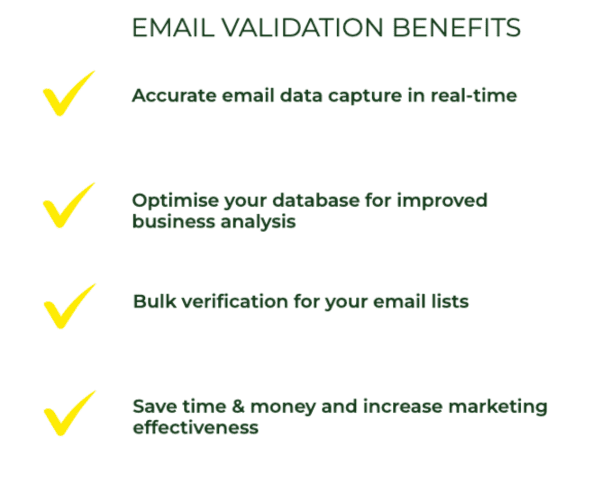Email validation and email verification are essential processes that businesses can implement to ensure the accuracy and effectiveness of their email communications.
While both aim to improve email deliverability rates and reduce bounce rates, they differ in their methods and purpose.
Browse the integrations compatible with Hopewiser plug-ins, including CRMs
Email validation focuses on removing invalid or incorrectly formatted email addresses, while email verification goes further to verify the deliverability of an email address in real-time.
By combining both processes and implementing robust email marketing strategies, businesses can improve their email deliverability rates, reduce bounce rates, and increase the effectiveness of their email campaigns with affordable pricing.
Email Validation
Email validation is the process of ensuring the validity and accuracy of an email address. It involves a series of checks to verify the format, syntax, and domain existence of an email address.
The purpose of email validation is to improve the quality of your email list by identifying and eliminating invalid and undeliverable email addresses or incorrectly formatted email addresses.
By doing so, you can reduce the likelihood of bounced emails and improve your email deliverability and open rates through catch-all authentication.
One of the primary benefits of email validation is its ability to detect and correct syntactical errors in email addresses. It performs checks for common errors, such as missing or extra characters, typos, and special characters that may not be allowed.
By identifying these errors, businesses can correct them and ensure that emails are sent to valid and functional addresses. This helps maintain a clean email list and increases the chances of successful email delivery.
Furthermore, email validation enhances the sender’s reputation. When emails are sent to invalid or non-existent addresses, it can result in a high bounce rate, which negatively impacts sender reputation.
Upon receiving multiple hard bounces, email service providers may identify the senders’ domain name as a potential source of spam and route future emails to the recipient’s spam folders.
By utilising email validation services, businesses can detect and eliminate such temporary addresses from their email lists, ensuring that their messages reach legitimate email accounts and real customers.
Email validation plays a vital role in enhancing the quality of email lists and improving email deliverability rates.
Email Verification
Email address verification is the automation process of confirming the validity of an email address. It goes beyond simply checking for syntactical errors and examines the deliverability of an email address.
During the verification process, the email address is checked against the email server to determine if it exists and if incoming emails can be received.
Email verification tools offer several benefits for businesses. Firstly, it ensures that bulk email lists are clean and up-to-date.
By removing invalid and inactive email addresses, businesses can reduce their bounce rates and improve the overall deliverability of their email campaigns. This is especially important for email marketers who rely on high conversion rates from their email marketing efforts.
Sender reputation can be maintained with email verification. High bounce rates result from sending emails to invalid addresses which not only affects deliverability rates but also harms the sender reputation.
Email service providers recognise a high bounce rate as a sign of poor email list hygiene and may route future emails to the recipient’s spam folders. By regularly verifying email addresses, businesses can prevent this and maintain a positive sender reputation.
While email verifier services offer numerous benefits, it also has its limitations. One limitation is that it cannot always detect temporary or disposable email addresses.
Some users may create temporary email addresses on mail servers to sign up for services or receive notifications without providing their actual email addresses.
These temporary addresses can negatively impact deliverability rates, as they are often abandoned or become inactive over time.
Email verification may not always be able to identify and filter out these temporary addresses, leaving businesses vulnerable to sending emails to non-responsive recipients.
Conclusion
Email validation, as offered by Hopewiser’s email validation tool and service, provides businesses with real-time verification of emails, ensuring email lists are clean.
By removing invalid and inactive email addresses, businesses can reduce bounce rates, increase the chances of their emails reaching the intended recipients’ inboxes, and improve their overall conversion rates.
Additionally, an email validation process helps businesses maintain a positive sender reputation by preventing emails from being sent to invalid or non-existent addresses.
Ultimately, the choice between email verification and validation depends on the specific needs and goals of the business. Some businesses may find that email validation is sufficient for their needs, while others may require the added security and accuracy offered by email verification services.
Regardless of the method chosen, implementing regular email list hygiene practices is crucial for maintaining a clean database, improving email deliverability and maximising the effectiveness of email marketing campaigns.
With expertise in data quality and address validation, businesses can trust Hopewiser to provide accurate and real-time verification of email addresses, helping them achieve better results from their digital marketing efforts.
, updated 1st May 2025.










